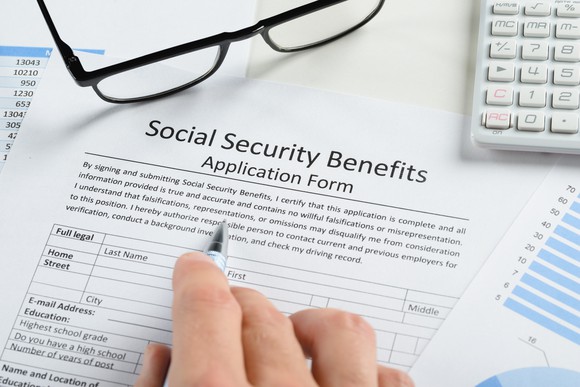There's perhaps no decision that's more important to senior citizens than deciding when to claim their Social Security benefits.
According to the Social Security Administration, 62% of today's aged beneficiaries lean on the program for at least half of their monthly income, with 34% virtually reliant on Social Security for all of their income (90%-plus). A poorly thought-out claiming decision could mean leaving thousands, or tens of thousands of dollars in lifetime benefits lying on the table.

Image source: Getty Images.
Financial expert Suze Orman pushes for seniors to wait on Social Security
However, the most logical claiming decision appears to be to wait as long as possible. The reason? Though retired workers become eligible for benefits at age 62, your benefits grow by approximately 8% annually for each year you hold off, up until age 70. Hypothetically speaking, if we were to look at two identical retired workers who had the same earnings history, work history, and birth year, with one claiming at age 62 and one claiming at age 70, the one who claims at age 70 will have up to a 76% higher monthly payout than the worker claiming earlier.
This "wait until 70" advice is something that financial expert and former CNBC host Suze Orman has pushed to her audience. In a recent online report with AARP The Magazine, Orman wrote,
Delaying Social Security can be the most precious tool in your retirement planning kit. Delaying your Social Security start date until age 70 entitles you to a monthly payouts that's more than 75 percent higher than your age 62 benefit.
Orman also cites the fact that, according to the Centers for Disease Control and Prevention, the average 65-year-old will live another 19.4 years. This means extra forward planning is needed for generations of Americans who might live significantly longer than expected.
Lastly, Orman recommends working longer than your early 60s in order to give your retirement accounts an opportunity to last longer, as well as give yourself the chance to pay down or pay off any remaining debts, such as a mortgage.

Image source: Getty Images.
Waiting until age 70 doesn't work for everyone
To be perfectly clear, I believe Suze Orman is a smart, skilled financial strategist. And the advice she's offered to AARP The Magazine is perfectly sound for some retirees. Unfortunately, there's a pretty sizable group of seniors who could be leaving a lot of lifetime benefits on the table if they follow Suze Orman's Social Security advice (even with Orman noting that claiming at 70 isn't for everyone, in passing).
For example, a person with a chronic health condition, or with immediate relatives who passed away before reaching the average life expectancy in the U.S. of between 78 and 79 years, may not be wise to wait until age 70.
You see, even though an early claimant would be taking a permanent reduction to their monthly payout, they'll receive this lower payout for up to 96 months prior to the age 70 claimant receiving their first benefit check. Again, assuming we were looking at two identical individuals, the lifetime value of benefits accrued would be equal right around their 78th to 79th year in age. In short, if you don't believe you'll reach the average U.S. life expectancy, claiming early can net you more in lifetime benefits. And remember, it's all about your aggregate benefits received, not just your monthly check.
Another situation where waiting may not make sense is if you're a notably lower-earning spouse relative to your husband or wife. Ideally, the spouse with the substantially higher lifetime earnings will let their benefit accrue at 8% per year until age 70. That way, when finally claimed, it'll have a larger impact on household income. But there's a good chance this couple would still want to generate some income in the meantime. If neither is working nor can work, the lower-earning spouse claiming early can be an easy and prudent way to generate some household income.

Also keep in mind that some aged Americans aren't able to work until their late 60s or into their early 70s. Some have physical or health limitations that could prevent employment, while others could simply face the challenge of finding employment commensurate with the experience and skill set. For these folks, claiming early may not be much of a choice and more of a necessity.
The rich (who want to minimize their federal tax bill), seniors who are deeply indebted, and those worried about a possible cut to their payout by 2034 as a result of congressional inaction, may also benefit by claiming early.
One-size-fits-all doesn't work with Social Security
Ultimately, your claiming age will prove to be a bit of a crapshoot since none of us (thankfully!) knows our expiration date. Therefore, all we can do is take the financial, health, and marital information we have before us and make the best decision possible for our unique situation. While Orman's approach is a smart one for a number of future retirees, it's far from a fix-all that ensures everyone comes out a winner.